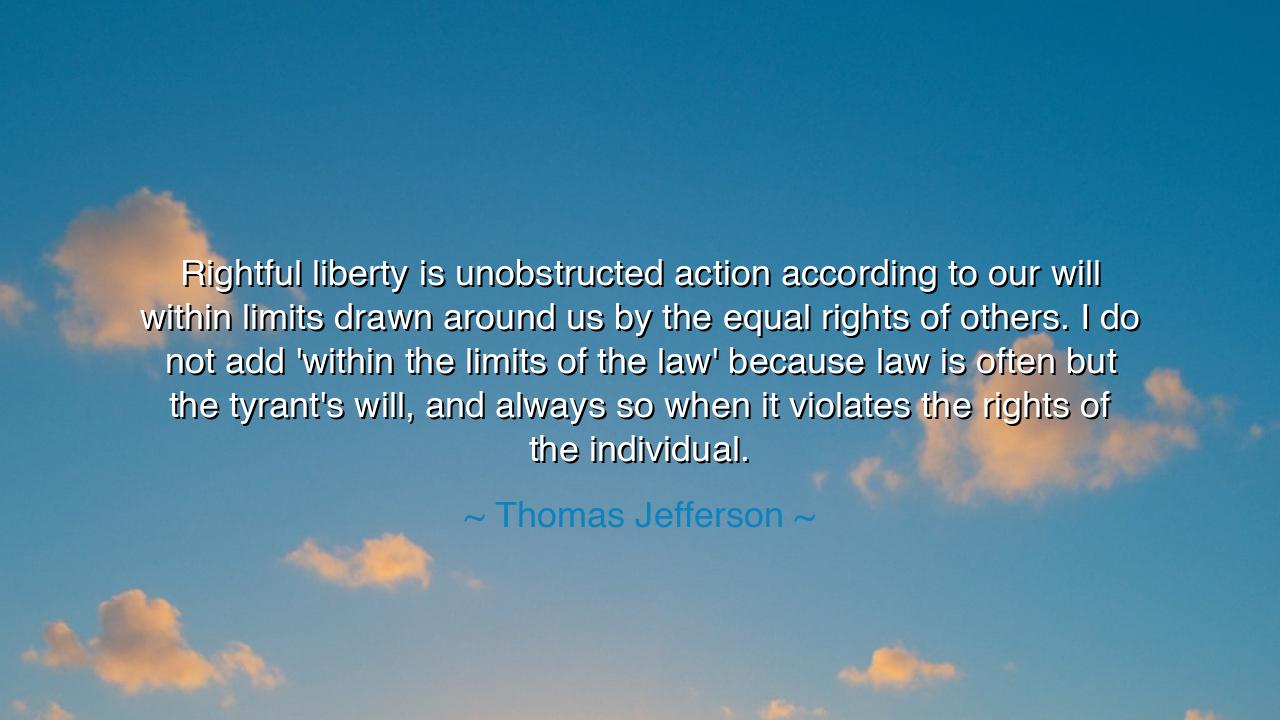
Rightful liberty is unobstructed action according to our will
Rightful liberty is unobstructed action according to our will within limits drawn around us by the equal rights of others. I do not add 'within the limits of the law' because law is often but the tyrant's will, and always so when it violates the rights of the individual.






When Thomas Jefferson wrote, “Rightful liberty is unobstructed action according to our will within limits drawn around us by the equal rights of others. I do not add ‘within the limits of the law’ because law is often but the tyrant’s will, and always so when it violates the rights of the individual,” he spoke as both philosopher and sentinel — a guardian of freedom against the creeping shadow of oppression. In these words lies the very soul of the American ideal, born not from chaos or lawlessness, but from moral order — the understanding that true liberty rests not in license, but in balance. Jefferson’s wisdom reminds us that freedom must never be surrendered to power disguised as law, nor must it trample the equal dignity of others.
In the style of the ancients, one might say that Jefferson spoke with the fire of Prometheus and the caution of Solon. For he saw that liberty, divine in essence, can perish not only under tyranny, but also under the complacency of those who mistake obedience for virtue. To act “according to our will” is to honor the divine spark of choice and conscience within every person — that sacred faculty by which man distinguishes himself from the beasts and from the slave. But this freedom is rightful only when it recognizes that others, too, possess the same sacred spark. Thus, the circle of liberty is drawn not by the decree of kings or judges, but by the mutual respect of equals — each free, yet none permitted to destroy the freedom of another.
The origin of this quote reflects Jefferson’s lifelong meditation on liberty, shaped by the fires of revolution and the disappointments of governance. Having penned the Declaration of Independence — that immortal cry for human rights — Jefferson later saw how even free nations could drift toward tyranny under the guise of legality. He knew that law, though necessary, is not infallible; when written by the corrupt, it becomes a weapon rather than a shield. His words stand as a warning: never confuse legality with morality. The tyrant cloaks his power in statutes; the free man measures justice by principle, not decree.
History is rich with examples of Jefferson’s truth. Consider Socrates, condemned by lawful decree in ancient Athens for teaching truth to the young. The law said he must die, yet the conscience of mankind said he was innocent. Or look to Martin Luther King Jr., who, centuries later, echoed Jefferson’s spirit when he declared that “an unjust law is no law at all.” King, like Jefferson, understood that when law violates the rights of the individual, it ceases to be law — it becomes tyranny dressed in order. Both men taught that liberty and conscience stand higher than any parchment of authority, and that obedience to injustice is itself a betrayal of the human soul.
Jefferson’s teaching carries both majesty and danger. He does not call for rebellion without cause, nor anarchy without direction. He calls for moral vigilance — the courage to question power, and the wisdom to govern oneself. Freedom, he reminds us, is not the absence of restraint, but the presence of righteousness. It requires self-discipline, empathy, and courage — the understanding that liberty without virtue becomes chaos, and law without justice becomes tyranny. The harmony of the two, balanced by equal rights, is the foundation of a just and lasting society.
His words also speak to our age, when many mistake comfort for freedom and legality for justice. Jefferson warns us that liberty must be guarded not by armies, but by conscience — that each citizen must become the keeper of his own freedom and the protector of another’s. To live as a free person, one must ask: “Does my will honor the rights of others? Do the laws I obey serve justice, or merely power?” For liberty begins not in the halls of government, but in the discipline of the soul.
The lesson is eternal: rightful liberty is a sacred trust, both a right and a duty. Defend it when it is threatened, but do not abuse it when it is yours. Respect the boundaries of others as fiercely as you guard your own. Stand against unjust laws — not with violence, but with truth, courage, and integrity. Let your conscience be your compass, and let empathy be your measure. For the world has no shortage of laws, but it always hungers for justice; it has no shortage of rulers, but too few free souls who govern themselves.
And so, let Jefferson’s words be passed down as a living creed: freedom is not granted by rulers, but by righteousness; not preserved by obedience, but by moral courage. When each man lives in awareness of his own liberty and the liberty of others, the tyranny of law gives way to the rule of conscience. Then, and only then, does humanity rise to its highest calling — to live as free beings, bound not by chains, but by the sacred harmony of equal rights and rightful liberty.






AAdministratorAdministrator
Welcome, honored guests. Please leave a comment, we will respond soon